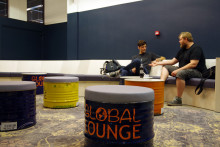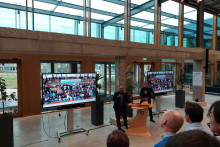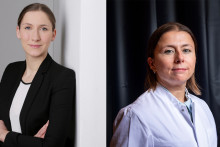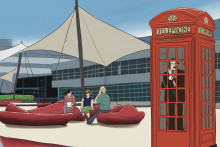Of the five consultations he could receive within his health insurance for internationals, Javier* used four. ‘I wanted to give it a chance. In the end, I tried to shake off my problems and went on.’
Non-European students have a hard time on campus, according to a report from the personal circumstances committee that was the topic of a U-Today publication. Last academic year, one in three of these students applied to the UT to postpone binding study advice or for financial benefits due to study delay. These numbers are 'very worrying' and ‘unacceptable’, the committee wrote in its report.
Javier is such a student. The Mexican student had already experienced what it's like to leave the parental home, as he graduated at a boarding school in the United States. He chose Twente because of the curriculum, but also because of the promise of the UT. 'The most international university in the Netherlands, in the second largest English-speaking country in Europe,' he recalls. 'You do not have to speak Dutch to succeed here', he read.
Completely excluded
But the sophomore felt lost in Twente. ‘I hardly have a connection with my fellow students,’ he says. 'If I talk to others, it’s superficial. The official language is English, but already during the Kick-In students communicate in Dutch in the Whatsapp groups. So you are completely excluded. This is even more the case in the communal areas. When I enter, I’m pretty much always surrounded by Dutch, which makes integrating hard or even impossible.'
He did not want make a big announcement of his struggles. So Javier did not plan on telling anyone, until an incident, now a year ago. Javier traveled through the United States, the country where he received his high-school diploma. ‘My visa had expired, I was taken away and put in an isolated cell for twenty-eight hours,’ he says. ‘They saw and treated me as a criminal.’
The incident marked him, and he made an appointment with a UT psychologist. ‘But I could not tell my whole story. It was not just about that incident, but also about the alienation that I feel here on campus. I received pity, but that was not the help I was looking for. Therefore I hardly share my experiences with other students, because you can predict what the reaction is. Pity, and everyone will be on their way.’
Recognizable story
According to Nynke Tilkema, chairman of the umbrella organization for the international associations UniTe, this story is not unfamiliar. ‘Yes, lots of non-European students encounter difficulties,’ she says. 'Studying abroad is expensive and that creates pressure. It is not uncommon that an entire family saves up for the study of one child, so the student feels the need to succeed. In many cultures you are brought up to be grateful, and you shouldn’t critique your education system. Because of this, it is hard to ask for help and they might struggle on too long and they regularly leave the UT. Don’t forget, these problems concern eighteen and nineteen-year-olds, who have to arrange everything themselves in a foreign country. '
'You expect an English-language campus'
The Vietnamese sophomore Linh* came to Enschede directly after high school. 'You come here, expecting the campus to be entirely English. Already at the Kick-In, that image falls apart. I did have a good time, but only with internationals. Many Dutch students do not go through the trouble of speaking English. One-on-one maybe, but if you try to mingle in a group, they usually keep talking in Dutch.’
The curriculum is fine for Linh because of the English working language. But socially, she faces obstacles. ‘It's just no fun to join a smaller sports club,’ she says. ‘As an international you get pushed out, because you don’t get involved and you don’t know what is going on.’ She calls it a vicious circle. Linh would like to be active at a sports or study association, but they aren’t welcoming for internationals. 'As a result, more and more non-Dutch students quit, and the Dutch are even more prevalent. I wanted to do a committee in my study association, and sent a job application. I was refused because I hadn’t been active before. That is also the vicious circle.'
'The Dutch think we are stupid'
The Indian student Arjun* sees that excluding of internationals happening in the classroom. 'Dutch students, but also from Europe, often think that we are stupid. We work in project groups a lot, and they do not want to include us. Personally, I don’t have too many difficulties, but I know a lot of compatriots who do. We Indians therefore group together and form our own groups. But that is often only with two people, where a project group should consist of four or five students. That produces work pressure. In the past year, at least five Indian students from my study program stopped and went home for that reason.'
Without a scholarship
Javier, Linh and Arjun all study at the UT without a scholarship and pay the institutional tuition fee. They are fortunate that their parents can pay for the study, but it does bring pressure. The father of the Mexican student Javier might lose his job in the near future. ‘I pay my study with saved money,’ he says. ‘With that, I can make it to the end of curriculum. But it does generate pressure.'
Linh feels that pressure too. 'I am happy that I can study in Enschede. In Vietnam I have a younger brother and sister, they also want to study. I do feel guilty about how much my study and accommodation costs, and that I use up the savings of my parents. Therefore, I really would like to work. But that is very difficult. If you want a job, the employer must arrange the work visa. Most companies don’t want to go through the hassle.'
The fair story
The UT knows how to promote itself outside the Netherlands, according to the students. But they do miss the 'fair story'. Arjun: 'The Netherlands is incredibly bureaucratic, you really need to get used to that. If you want to move to another house, the government must know or your visa will be at risk.’
He continues: ‘In my home country you go to a specialist immediately if something is wrong with you. Here you first have to go to a general practitioner. You have to find out these things by yourself. I never heard of the ‘wet modern migratiebeleid’ until I was in the Netherlands. This law says you must earn half of the EC’s annually, otherwise you will lose your visa. I think this is very relevant information, that one should be aware off before enrolling. '
* At the students request, their names have been made anonymous for this article.







